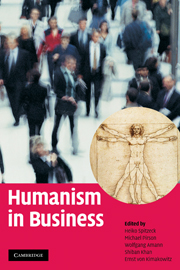Book contents
- Frontmatter
- Contents
- List of figures
- List of tables
- List of editors and contributors
- Acknowledgements
- Humanistic Management Network: paving the way towards a life-serving economy
- Introduction
- Part 1 Philosophic-historical grounding of humanism
- Part 2 Towards an integration of humanism and business on a systems level
- Part 3 Humanistic management
- Part 4 The individual as a change agent for a humane business society
- 19 Ethical codes at work
- 20 The daunting challenges of globalization and the power of individuals in cross-stakeholder networks for a humanistic face of globalization
- 21 The leader as responsible change agent: promoting humanism in and beyond business
- 22 Quiet leadership – a way to sustainable positive change
- 23 Everyone a changemaker: social entrepreneurship's ultimate goal
- 24 Social business entrepreneurs are the solution
- 25 Concluding observations
- Index
22 - Quiet leadership – a way to sustainable positive change
Published online by Cambridge University Press: 25 January 2011
- Frontmatter
- Contents
- List of figures
- List of tables
- List of editors and contributors
- Acknowledgements
- Humanistic Management Network: paving the way towards a life-serving economy
- Introduction
- Part 1 Philosophic-historical grounding of humanism
- Part 2 Towards an integration of humanism and business on a systems level
- Part 3 Humanistic management
- Part 4 The individual as a change agent for a humane business society
- 19 Ethical codes at work
- 20 The daunting challenges of globalization and the power of individuals in cross-stakeholder networks for a humanistic face of globalization
- 21 The leader as responsible change agent: promoting humanism in and beyond business
- 22 Quiet leadership – a way to sustainable positive change
- 23 Everyone a changemaker: social entrepreneurship's ultimate goal
- 24 Social business entrepreneurs are the solution
- 25 Concluding observations
- Index
Summary
Every profession and walk of life has its great figures, leaders, and heroes. Think of the men and women who create or transform major companies, the political leaders who reshape society, the firefighters who risk their lives to save others. We exalt these individuals as role models and celebrate their achievements. They represent, we feel, the true model of leadership.
But do they really? I ask this because, over the course of a career spent studying management and leadership, I have observed that the most effective leaders are rarely public heroes. These men and women aren't high-profile champions of causes, and don't want to be. They don't spearhead ethical crusades. They move patiently, carefully, and incrementally. They do what is right – for their organizations, for the people around them, and for themselves – inconspicuously and without casualties.
I have come to call these people quiet leaders because their modesty and restraint are in large measure responsible for their impressive achievements. And since many big problems can only be resolved by a long series of small efforts, quiet leadership, despite its seemingly slow pace, often turns out to be the quickest way to make an organization – and the world – a better place.
Stories of heroic effort do teach us indispensable lessons in courage and dedication. They also show us the highest human ideals and help parents and teachers pass on important values.
- Type
- Chapter
- Information
- Humanism in Business , pp. 375 - 387Publisher: Cambridge University PressPrint publication year: 2009
- 1
- Cited by



